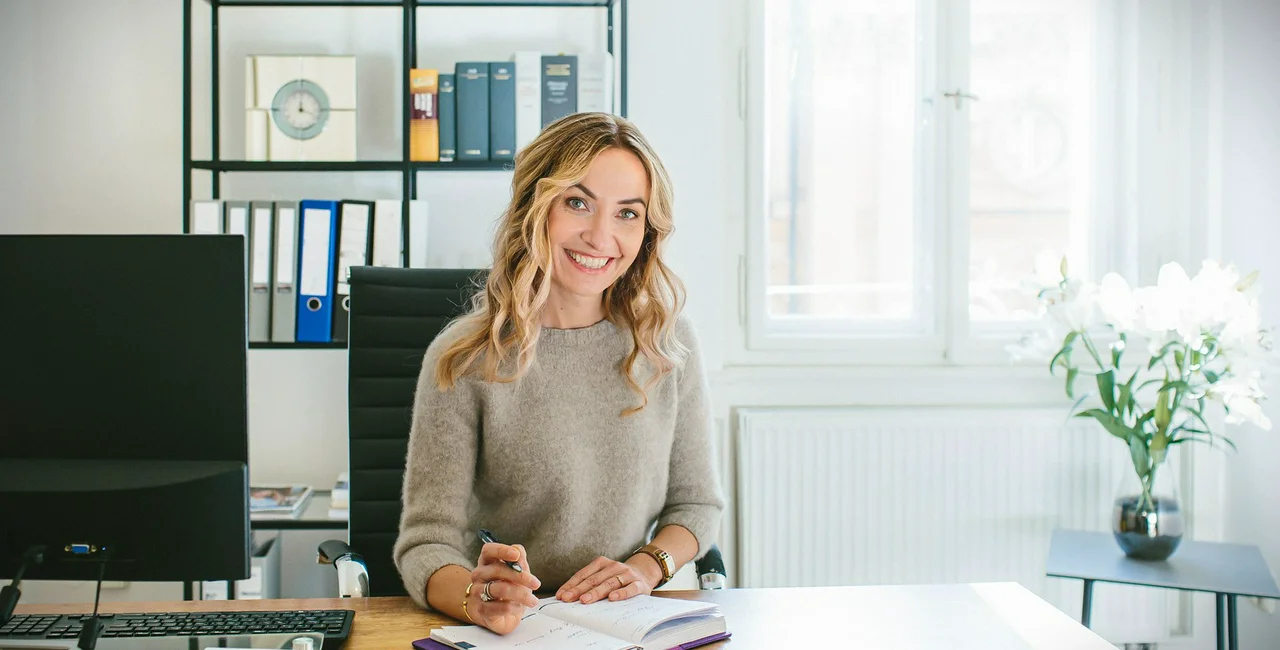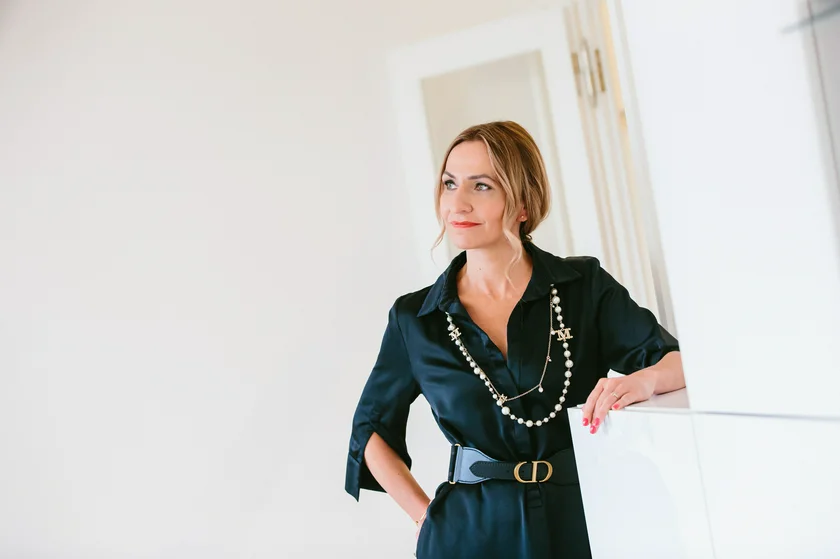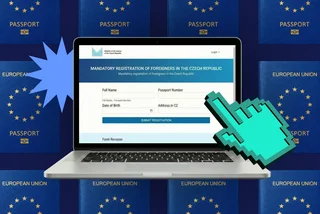Wherever you live, the need to deal with legal issues is an inevitable fact of life. For expats living in Czechia, this necessity can become a major headache as the language barrier and unfamiliarity with the Czech legal system cause extra complications.
Getting strong legal support from a team of lawyers experienced in helping expats is a must. Many turn to LN Law Office Prague, a “boutique” law firm based in Prague’s Vinohrady district, which supports clients through everything from divorce proceedings to purchasing property and even criminal cases.
Expats.cz sat down with Lucie Martin Nešporová, the founder of LN Law Office Prague, to discuss how her business helps expats navigate Czech legal proceedings, the peculiarities of the Czech legal system, and succeeding as a woman in the Czech law environment.
Could you explain the history of LN Law Office Prague and its offer to clients?
I’ve been working as a lawyer since 2005, with a break in the middle during which I worked in France as a diplomat. When I came back to Czechia in 2018, I created this law firm.
Before starting this firm I practiced law alone, and my goal was not to create my own business. Life brought me to that stage by itself, so I decided to create something small, but perfect. I didn’t want to have a huge law firm, but a nice place with a strong team and a high level of services. I call these “boutique” services, because our firm is different from the big law firms, which can be a bit like a factory in my opinion, with lots of clients and cases.
I wanted to have personal contact with the clients, knowing everything about their story and legal affairs and what they need, because only in this way can you really help them. Each member of our team knows what is happening in each other’s cases, because we have to be replaceable; someone is always available to help our clients.
I based our concept on my own experience living abroad. I lived in France and met a lot of local people, but also a lot of Czech expats living there. I saw clearly the kinds of legal issues that people have when they’re living abroad and how these issues can be different from those that you face in your own country. This experience helps me today, because I can understand clients’ current problems and foresee what issues could be coming next.
An important part of our services is international private law, meaning any kind of conflict between legal systems. When expats have a problem, issues need to be resolved in the relationship between Czech law and the legal system in their home country. We specialize in the field of family law, dealing with divorces, property divisions, custody disputes, kidnapping of children, and so on. We also deal with civil law including property purchases. Civil law is a very broad area, and we also help our clients establish their own business, deal with their employees, and deal with other similar issues.
We currently have three lawyers, one assistant and one person responsible for accountancy and administration. I would like to expand further, but the problem is finding the right people. We need lawyers who are fluent in English and French, as we have 50 percent English-speaking and 50 percent French-speaking clients. We need people who can deal correctly with our cases and fit in with us.
Do you tend to have long-term cooperation with clients or do people come to you for one-off support?
It’s mostly long-term relationships, because a huge problem in Czech court proceedings is that everything takes a very long time.
At the same time, clients tend to come back to us with any other issues after they are satisfied with the legal services we’ve already provided, and they also often recommend us when family or friends need legal support. Most of our clients join us on the recommendation of another client or from friends that spoke well of us. Once they come to us, they tend to stay for life.
Do legal proceedings in Czechia tend to take longer than in other European countries such as France?
I would say so, and I would say that this is a very weak point of Czech justice. Here’s an example: somebody didn’t pay your invoice, so you decide to go to court. If you have good luck, the first proceeding could take one or two years. But afterwards the judgment can be appealed, so you go on for another year or two, or even more. Cases with an international element can be so complicated that they go on longer; I have a case that started in 2017 and is still not finished.
I’m always honest with our clients. I say: “Let’s go for it, but you might wait six years, and you could spend more on pursuing the case than you will receive in compensation at the end.”
What’s the usual process for starting cooperation with a new client?
The first contact usually takes place via email. The client describes the problem, after which I suggest an initial meeting. In order to be able to say whether or not we can help, we generally need much more information than clients imagine!
After this initial meeting, during which I describe all the conditions and estimate the budget, I explain the possibilities to the client and what they can expect. It’s then up to the client to decide whether to proceed.
What kinds of legal services are most commonly needed by expats in Czechia?
Divorce, child custody, property division, purchase of real estate, and inheritance proceedings. Labor law proceedings are also common, as a lot of expats work here and need help with employment issues.
How do you help expats feel less confused and daunted by legal proceedings?
By suggesting solutions. It’s important to remember that in the law, nothing is clear. Everything is a matter of interpretation. But if I, as your lawyer, say that things are very complicated and that I’m not sure how to proceed, it will make you even more stressed! I’m very target-oriented; I believe in simple solutions and being efficient.
When a client comes to me and explains the problem, it’s vital to analyze and establish the legal ground on which you stand; where you can move, and where you can’t. If you explain this in an understandable way that allows the client to make a decision, the client feels better, because they see that they are no longer lost.
How does working with a Czech client differ from working with an expat?
The actual form of cooperation is no different. The difference is simply that a typical Czech client will read information on Google which they won’t understand and then try to explain to us! I prefer working with foreigners; if you explain things to them clearly they are often more willing to listen to advice.
On the other hand, when foreigners aren’t happy, they typically complain that “this would never happen in my country!” Of course, we know perfectly well that this isn’t true.
All of us here are empathetic people. Part of being a good lawyer means understanding what a client is expecting, what will make them happy, what you should or shouldn’t say in the present moment. Sometimes I even feel like I’m a psychologist; clients come to discuss a legal issue but they also go in-depth into their personal troubles.
Could you explain your personal and professional journey that led you to where you are today?
I studied law in Pilsen, and I was always clear about what I wanted to do: to be an attorney-at-law. After my studies, I worked in Prague for a law firm. In Czechia, if you want to become an attorney, you must work for at least three years, either in a law firm or at the courts. After these three years, you can pass your exams at the Czech Bar Association.
I succeeded and my career was progressing very well when I met my future husband, who is French. After a period of being in a long-distance relationship I decided to move to France.
I still worked, very much in the way that we have learned to work as a society over the past three years, by home-officing and by working online. I came here once per month for a week to go to court. It was difficult to combine this lifestyle with having a family, and when I gave birth to my son, I took maternity leave. I must say that I was happy to take a small break at that time.
When my son was three, I started to ask myself what I was going to do; I had tried several times to work as a lawyer in France, but it was almost impossible. The language wasn’t an issue, but you can’t work as a lawyer if you don’t know the law, and that would have meant starting from the beginning, which I wasn’t willing to do.
Suddenly, I got the opportunity to apply for a job at the Permanent Representation of the Czech Republic mission at the Council of Europe; they needed a diplomat with very good French to prepare the Czech chairmanship. I got the job and worked as a cultural attaché responsible for cultural representation of the Czech Republic during the chairmanship. When the chairmanship was over, I was wondering whether to continue with my career in diplomacy or return to law.
I missed the law. For me, diplomacy is very slow. Things take time; it’s about talking, talking, and more talking, hoping that in the end you will achieve something. So I decided to come back to Prague with my family and establish this company, going back to doing what I love.
I never originally planned to have my own company, as I already mentioned, because I love being an attorney. When you have a company, 60 percent of your time is spent on administration and management, and only 40 percent is actually doing legal work. But setting up the firm came naturally, and seeing how my employees are progressing and growing brings a new kind of satisfaction.
What drew you to the legal profession in the first place?
This is a question for a psychologist! When I was small, my parents divorced, and this had a huge impact on me. I decided that I wanted to help people resolve their problems, so perhaps it’s a process of healing.
What skills that you learned while living in France do you still use today?
First of all, my perfect French. French-speaking clients really appreciate this, because as a foreigner, being able to express what you want and knowing that you will be well understood is very important. Also, I understand the French mentality and French culture. My colleague who previously lived in the UK has the same insights into British language and culture.
Living abroad also leads you to meet new kinds of people, which creates a unique kind of network that helps you gain insights and information when you need it.
Despite these benefits, I was delighted to come back to Czechia. Living in France isn’t just about drinking champagne and wearing Chanel! The country has a particular image, of course, but the reality of life is different.
What did you miss about Czechia while living abroad?
Feeling safe in the street. For me, this was also one of the main reasons for coming back with my family. My children were small and we were in France at the time of terrorist attacks. It wasn’t pleasant to see a military presence everywhere, whereas here your children can walk in the street and you don’t feel fear.
Would you say that it’s important for lawyers to have language skills and an international perspective?
It’s definitely important if you want to work in an international context. Although at the same time, in some countries such as France you have to conform to certain ways of doing things, so language skills are not everything. The Czech legal system is also very formalistic; you can have all the language skills, but you’ll still need to read judgements several times simply to understand what the judge is saying.
For foreigners living here, normal Czech language learning isn’t sufficient for this. A sentence in a judgment could take up a whole page, with expressions that you’ve never heard before; it takes a lot of skill just to understand what they are trying to say. I think you’d have to live long enough in this country to have a good understanding of the language and the system.
In that case, is there any chance for an expat to break into a law career in Czechia?
Of course, if they fulfill all the conditions that I spoke about. I would be very happy to find such a person to work with us. Someone speaking perfect Czech, French and English, living here and with a motivation to learn. The problem is that I don’t know any expats living here who speak Czech to a high enough standard! I admit that the Czech language is very difficult to learn.
To what extent would you describe the Czech legal environment as male-dominated, and do you think the situation is changing?
It is changing, but very slowly. If I compare the start of my career with today, things have changed, but it’s still male-dominated. And while I don’t look like a man, I have to conduct myself like a man in order to be successful.
The system itself is not very open to women, either. Just imagine: you finish your studies at the age of around 24, and you then have to do three years of full-time work experience – the Czech Bar Association does not count part-time work – before passing the exams. So, if you want to have a family, considering that in this country it’s usually the woman who stays at home, you must then choose between a family and your career.
-Lucie Martin Nešporová, founder of LN Law Office PragueThe system itself is not very open to women, either. Just imagine: you finish your studies at the age of around 24, and you then have to do three years of full-time work experience – the Czech Bar Association does not count part-time work – before passing the exams. So, if you want to have a family, considering that in this country it’s usually the woman who stays at home, you must then choose between a family and your career.
Is there any way that law firms or the system itself could change to better accommodate women?
It’s more the system that’s at fault. I personally wouldn’t have any problem hiring a lawyer who just finished their studies to work part-time. But the Czech Bar Association doesn’t count that into their obligatory practice. When you are already an attorney, you can work part-time without a problem.
Also, the job itself is very hard. You have to be online all the time, and if the judge decides on a court hearing and you want to change it because your child is ill, there’s no chance; they don’t care. I remember one situation when I wrote to the judge to say that I considered this to be discrimination; only after this would he change his mind and reschedule the court hearing.
The result of all this is that the majority of attorneys are men. And the same goes for the ranks of the justices. When you look at the judges, you see even fewer women. Just look at the number of women at the Constitutional Court; that says something about Czechia.
The mentality here is also different to other countries. We are actually very conservative. In France, for example, it’s more normal for women to work soon after having children. Many go back to work just three months after having a child, whereas here, we can stay at home for up to three years. If you went to work three months after the birth of your child in Czechia, you would be seen as a bad mother. I also know men in France staying at home on parental leave, which is something that does not happen much here.
What’s the current make-up of your company in terms of male and female lawyers?
We are currently an all-women team, although this wasn’t intentional. It’s more a male ego issue; it seems that it can be difficult for men to work with a female owner of a law firm. That’s my experience, at least.
Do young lawyers coming to work for you arrive with any common misconceptions or wrong expectations about the job?
In general, a huge problem in the education system is that everything is very theoretical. If you study law in this country, you will learn many things that you will never use in your life and won’t get a practical understanding of until you start working.
There is also not enough preparation for the reality of dealing with clients. There are some moot courts in law school, which provide some experience, but the lack of training in this area is another big problem.
What personal qualities do you need to do what you do and to be a success in the Czech legal sphere?
You have to have a very strong personality and be target-oriented. You also have to be very self-confident, because as I said, the law is a competitive working environment, it can even be rude at times. You have to know that you are able to handle this.
I think if I had been where I am today ten years ago, I wouldn’t have been successful. My personal and professional life experiences, including in diplomacy, have taught me to deal with emotions and with people, to better resist stress and the rudeness of others. I have a different approach now to what I had ten years ago.
For anyone looking to start a career in the law, my advice would be as follows: Be sure that you want it. People can get confused by the image of lawyers in the popular imagination. They expect lawyers to have a beautiful car and lots of money while doing nothing; that they simply read something, tell you something, and then charge a huge amount. But I have seen many people leave this job because it is simply too much stress.
Being a lawyer really means a lot of stress, deadlines, responsibility, battling with justices, studying plenty of documents, reading the law, consulting case law, and considering matters of interpretation. It takes hours of careful work before providing the correct response.
This article was written in cooperation with LN Law Office Prague. Read more about our partner content policies here.












 Reading time: 14 minutes
Reading time: 14 minutes 























